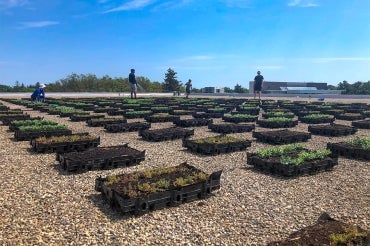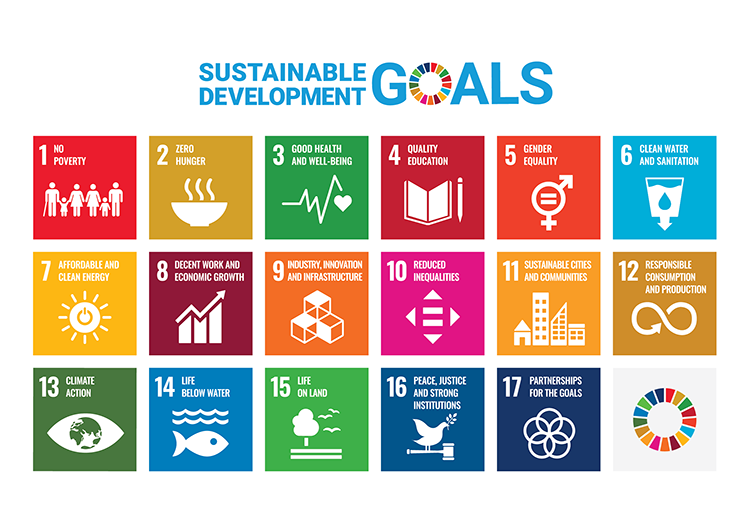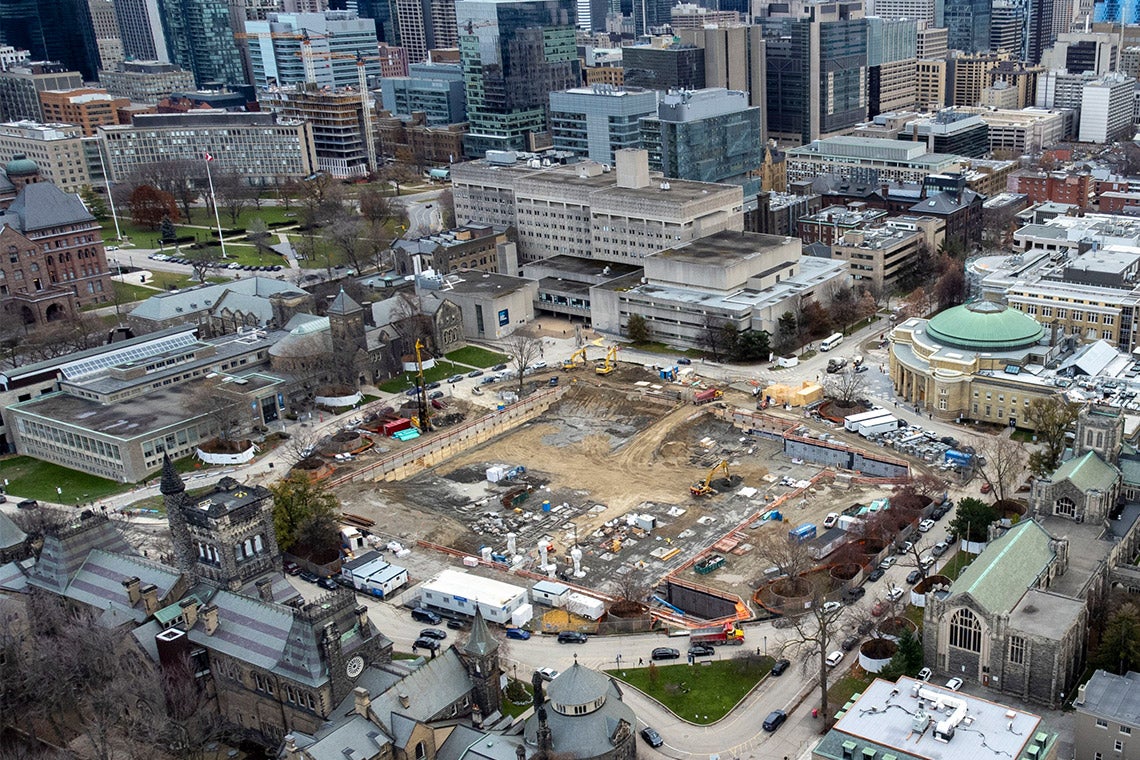U of T accelerates sustainability plan, taking its cue from UN Sustainable Development Goals

Published: December 14, 2021
The University is Toronto is moving to incorporate all the diverse facts of sustainability – from climate action and clean energy to social justice, equity and inclusion – into its academic activities, campus operations and collaborations with local and global partners.
In its fourth annual report, the President’s Advisory Committee on the Environment, Climate Change and Sustainability (CECCS) outlines how a recognition of the breadth and intersectionality of sustainability issues is increasingly driving initiatives across the university’s three campuses, with the United Nations Sustainable Development Goals (SDGs) serving as an overarching theme.
Some recent initiatives at U of T include the creation of an institutional strategic initiative (ISI) focused specifically on advancing the 17 SDGs at the university; the launch of “sustainability pathways” to help students explore sustainability from various academic perspectives and through co-curricular activities; and the mobilization of sustainability-minded students, faculty and staff through events such as the Adams Sustainability Celebration.
The committee is also looking to expand the availability of “living lab” projects that let students contribute to sustainability projects on and off campus; offer workshops to prepare students to be agents of change at work and in civil society after they leave U of T; and partner with likeminded universities, institutions and organizations on sustainability projects.

John Robinson, co-chair of CECCS and the president’s adviser on the environment, climate change and sustainability, said he’s heartened by how quickly awareness of and responses to climate change and sustainability issues are accelerating at U of T. “Things are really moving pretty quickly at U of T. It’s a big institution so it’s like a super tanker, it has a long turning radius. But given that, I think things are really happening in a big way,” Robinson said.
He added the COVID-19 pandemic has highlighted the extent to which issues such as social justice and equity intersect with efforts to tackle climate change and environmental damage. “The pandemic has brought to the forefront the recognition of what’s always been true but has been ignored for too long – that when it comes to sustainability and climate change, there are these huge ethical issues around social justice, equity, diversity and inclusion that have to be addressed and made front and centre,” Robinson said. “So we’re in a perfect storm of having to recognize that we can’t deal with these sustainability issues without also dealing with issues of social justice, equity and diversity.”
Accordingly, the CECCS report outlines several ways in which divisions across U of T are looking to contribute to addressing issues around equity and diversity, including: Procurement Services diversifying their supply chain to provide more opportunities to businesses owned by people from under-represented groups; the Daniels Faculty of Architecture, Landscape, and Design’s employment and mentorship program for Indigenous youth; and CECCS itself expanding its membership and appointing a seat for an Indigenous staff member.
The report comes on the heels of U of T’s announcement of commitments to divest from investments in fossil fuel companies by 2030 and achieve a climate-positive St. George campus by 2050. Earlier this year, U of T also announced that Ron Saporta, chief operating officer, property services and sustainability, would join Robinson as committee co-chair, a move designed to strengthen the academic-operational cooperation needed to make headway on U of T’s sustainability goals.

U of T President Meric Gertler congratulated the committee for its significant achievements over the past four years and said the university will continue to set and work towards ambitious sustainability targets. “As I indicated in my recent announcement to divest from fossil fuel investments and create a climate-positive campus, in light of the increasing urgency of the climate crisis, this is an opportune moment to commit to even more ambitious carbon reduction goals for the university’s long-term investments,” President Gertler said in a letter introducing the report. “It is also time to accelerate our action on the SDGs, including but going far beyond SDG 13 for climate action.”
President Gertler noted that CECCS’s work focuses on innovations concerning all 17 SDGs, and praised committee members for managing to embed sustainability into divisions and offices across the university.
In the case of the new institutional strategic initiative (ISI) for SDGs, the idea was borne out of “17 Zoom Rooms @ U of T,” a CECCS-hosted virtual event that brought together graduate students, post-doctoral researchers and professors for a brainstorming session on how to advance the 17 SDGs at U of T. A recurring theme of discussions at the event was the need for U of T to anchor more cross-disciplinary and inter-institutional initiatives. This led to the creation of the ISI for SDGs, which will define the formal vision for an inter-disciplinary research and education network, forge relationships, secure funding and create a roadmap to advance the SDGs at U of T.
“I think it’s a brilliant move on the part of U of T to create these horizontal linkages,” said Robinson, who sits on the SDG ISI’s steering committee. “We’re used to being in our disciplines, in our divisions, in our departments in a more vertical set of silos – so this is a real attempt to create horizontal connectivity.”
U of T has also been looking to create connections beyond university borders by engaging with likeminded institutions in Canada and across the world on sustainability. One example of this is the Urban Climate Action Network (UCAN), an initiative within the University Climate Change Coalition (UC3) that will see U of T and five other universities partner with their host cities to help them achieve their climate targets.
One of the initiatives under the U of T node of UCAN will involve more than 50 graduate students from the Munk School of Global Affairs and Public Policy working on projects with TransformTO, the climate action strategy overseen by the City of Toronto’s Environment and Energy Division, during the upcoming Winter 2022 semester.
“These aren’t projects that we dream up in the academy – these are actual projects that people in the city say they could use help on, so I’m really excited about that,” Robinson said.
CECCS is also exploring further opportunities for U of T students to contribute to climate action initiatives. “There are very ambitious targets that have been adopted by City Council, but the question is how do we achieve them? How do we, for example, retrofit every single building in the city of Toronto to net-zero or better by 2050? How do we make every new building built in the city after 2030 net-zero or better?” Robinson said. “These are massive targets. So the question is: how can we as a university get involved in this process, get engaged and contribute to reaching these vital targets?”
Robinson says part of the answer will involve engaging with private sector players, particularly on efforts such as building and retrofit projects.
The committee is also looking to expand opportunities for students to work on sustainability projects on campus and with external partners through “Campus as a Living Lab” and “Community-Engaged Learning” initiatives.
“Our goal is to have 1,000 students a year doing ‘Campus as a Living Lab’ projects and 5,000 students doing ‘Community-Engaged Learning’ projects with partner organizations,” Robinson said. “That’s one way that students can get deeply involved while they’re here and we want to make more and more of those opportunities available.
“We want student leadership to pervade everything we do because we believe strongly that students can take a very strong role in these matters and provide leadership.”
Robinson said the committee is also developing workshops aimed at helping students address their “very well-justified” anxiety about the future that awaits them and the planet.
“We feel that to simply suggest to them that they should consume less or recycle more doesn’t really address that anxiety in a very positive way,” he said. “So we’re planning to develop workshops that will be about how to become an agent of change after you graduate.” The workshops would cover topics such as how students can foster sustainability in their future workplaces, and examples of good practice and creative approaches that have been deployed by individuals to help change organizations.
“We think the idea of green jobs doesn’t make any sense because every job in the world involves people, so every job in the world has sustainability dimensions. So every graduate of the university can add a sustainability dimension to their work life.”
Robinson says he tries to help students to view the daunting challenges posed by climate change as opportunities. “We think this is an incredible opportunity to actually re-make the world in a better way. It’s not a trivial, simple or easy challenge… but it is an opportunity. I tell my students: you’re the generation that gets to fix this problem because this is when it has to be done – in the next few decades.”
He said one of the core principles embedded in CECCS’s work is “regenerative sustainability” – finding net-positive ways to boost both human and environmental well-being, rather than focusing solely on damage limitation.
“Human actions can actually simultaneously improve environmental circumstances and human well-being, and these net-positive outcomes are what we should be looking for: not net-zero, not just harm reduction, but net-positive. Let’s actually make things better,” Robinson said.
“We think it’s really important to take that positive approach because that’s what we need: a net-positive world.”



